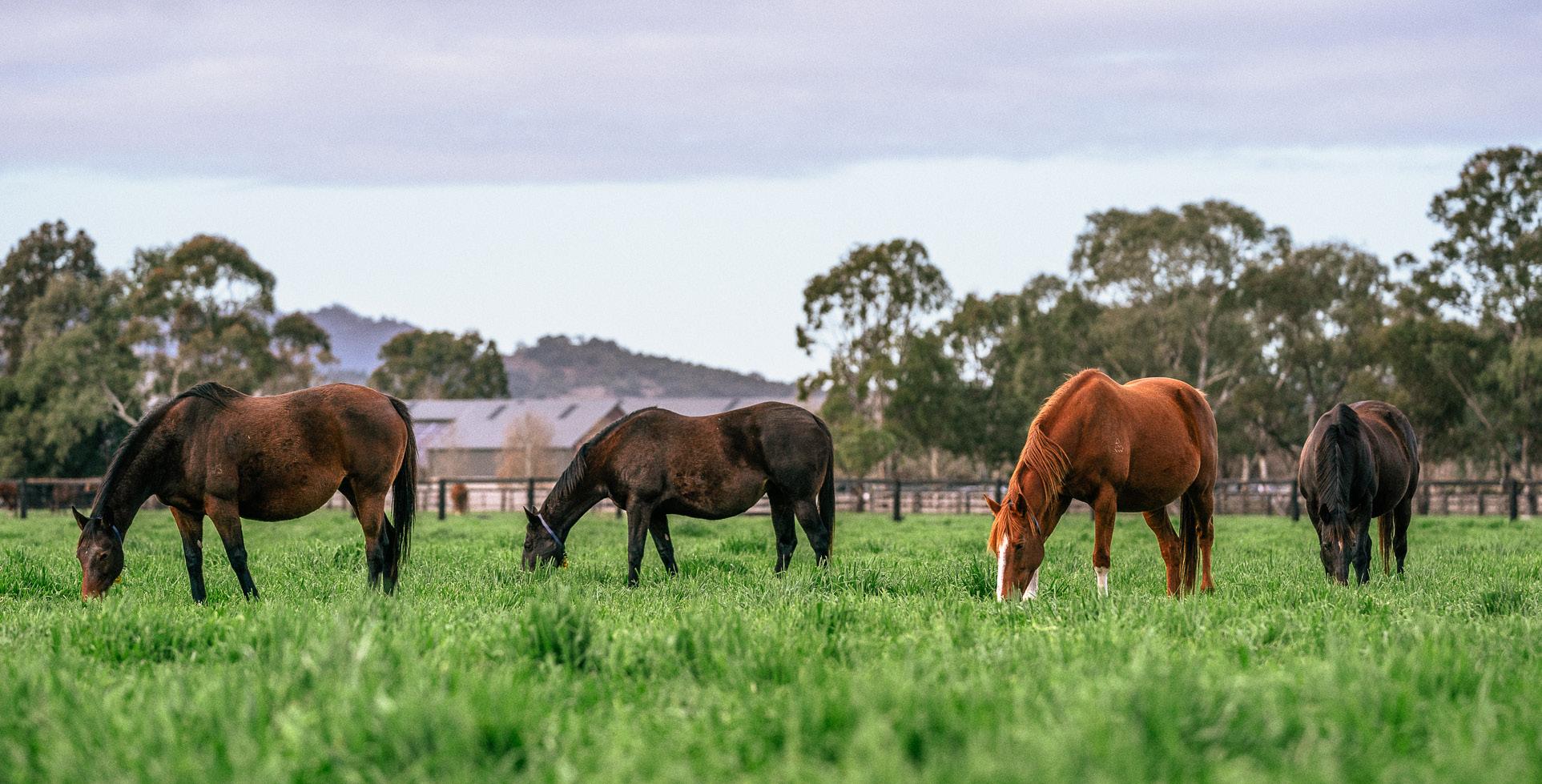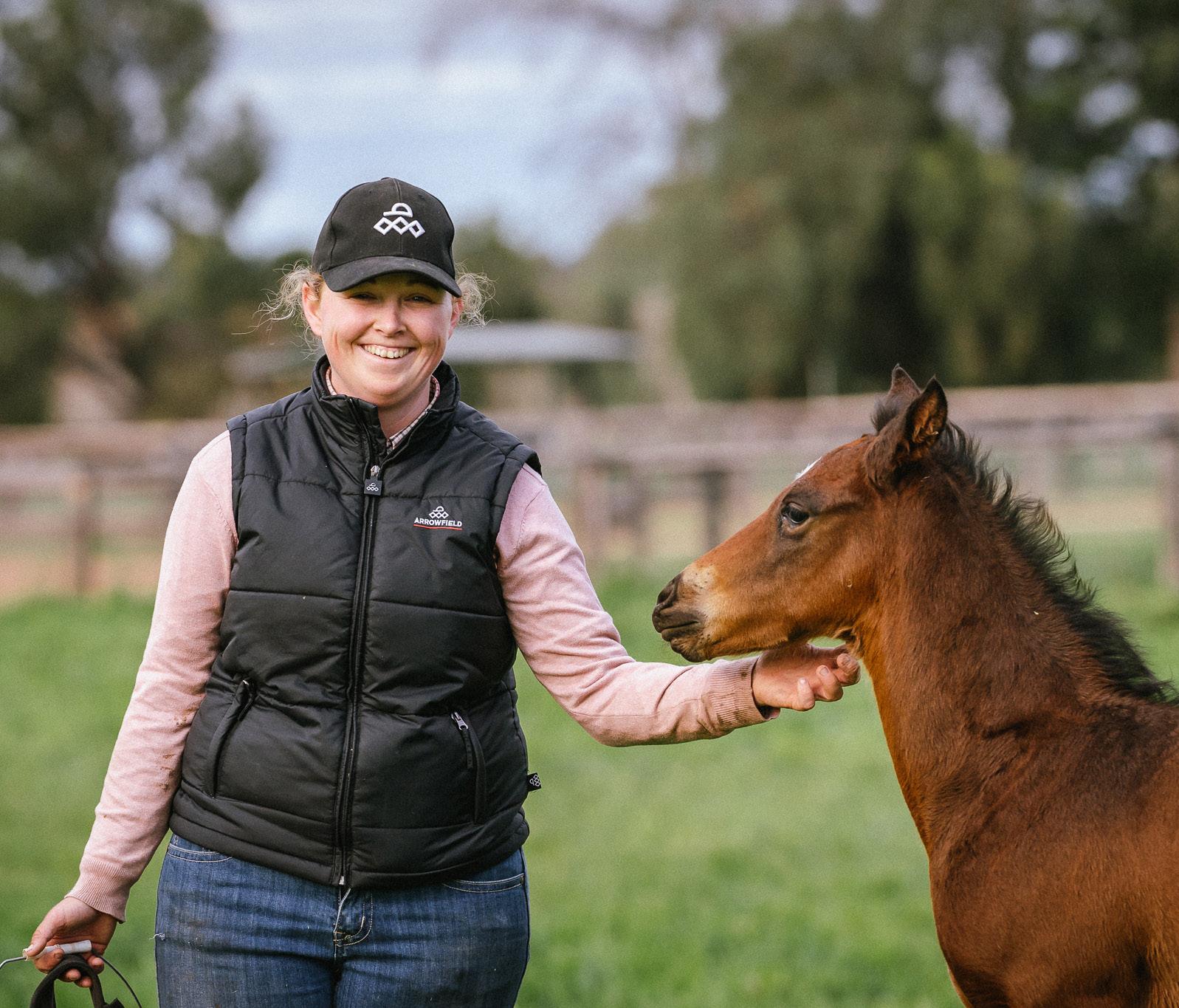
8 minute read
Life After Racing: When the stars align
LIFE AFTER RACING
When the stars align
Sometimes things, just like the partnership between Trina Crawford and Seventy Seven, are meant to be writes JO MCKINNON.
Competition continues to open up for off-the-track Thoroughbreds with a raft of events popping up all over Australia.
Last month, Equestrian NSW staged the Inglis Thoroughbred Classic during the Southern Cross Show Horse Spectacular, where retired Thoroughbreds were given the opportunity to enter one of two events, either the New Stars (horses with one to three years showing experience) or the All-Stars (horses with four years or more of showing).
I had the honor of being invited to join New Zealand trainer and equestrian Richard Otto, and NSW horsewoman Lyn Holgate as one of the three judges.
Combinations were required to perform a set workout and were ranked first through to last by each judge, with the winner determined on the highest number of votes. Each winner took home $1,000 along with trophies, a magnificent garland, and a wool rug.
Some of the best-performing horses and riders in the country took part and coped admirably with the cold, windy, and wet conditions on the day. Darkness had fallen by the time the All-Stars class got underway and an absolute stand out under the lights of the Sydney International Equestrian Centre was Trina Crawford's flashy chestnut gelding Seventy Seven.
Son of champion sprinter Choisir, he raced as Gold Seventy Seven when trained by Kris Lees at Newcastle. He was unbeaten in only three starts but tendon issues put an end to what was shaping up as a very promising career on the track.
It was during his racing career that Trina, who was working as a horse physio at the time, spotted the future show star while on a visit to the Lees’ stable. While waiting to treat a horse, she took a stroll through the barn and saw Seventy Seven’s head over his stable door. “I thought, wow you’re cute. So I took a photo and noticed his name the door,” she says.
Returning to the stable where she was treating horses, she asked the yard manager about Seventy Seven. “He asked why I was interested and I said he's one of the nicest babies I’ve seen in a long time," recalls Trina.
When she returned home that night Trina, a devout Christian, couldn't believe what happened. "I was reading my bible and opened it to where I’d bookmarked it. The page I was about to read had Seventy Seven written on the top. I wrote ‘wow’ next to it and the date."
Four years passed after that serendipitous moment and then she got a phone call to say Seventy Seven had been retired and would she be interested in taking him on.
The decision wasn't straightforward. A few years prior Trina had suffered a nasty fall from a horse that took fright at the Canberra Royal Show. She suffered a serious head trauma and neck injuries and was hospitalised for a month.
Having made good progress in her recovery, she decided to go out to view him. "I drove in, spotted him in the paddock and said ‘I'm taking that horse home’.”
Trina told her parents Seventy Seven was for someone else, but after a while, her mother asked why the horse was still in the paddock. “Well it goes like this,” Trina told her. “I had an accident, I didn't die and he's my new project." Unable to ride herself, Trina gave Seventy Seven 12 months off to let down from his racing life. Once he became more settled and relaxed her twin sister Trinette, a professional show rider, began training him under saddle.
Right from the beginning his career in the show ring was a success, with an early win in his novice hack class at the Royal Easter Show. The journey has been uplifting for Trina who assists with all his groundwork and preparation for events. "He's my heart horse. He's been the drive for me to want to keep going even though it's exhausting sometimes. When it's really hard I focus on him. He needs me.” Spectacular with Seventy Seven was a great thrill for Trina and Trinette, who rode him superbly and applauds events like this for providing pathways for Thoroughbreds after racing, and for keeping people interested in getting off the track horses
The New Stars class was won by the beautiful black Lonhro gelding Givenchy, ridden by Greg Mickan. He previously raced as Data Point when trained by Mick Kent and in a career spanning 24 starts won two races, earning just over $150,000 in prize money. Just a week after the Inglis Thoroughbred Classic, Racing NSW launched Equimillion, an exciting new event for off the track Thoroughbreds with a minimum of $1 million in prize money. The first event is scheduled for the 2023 October long weekend. We’ll keep you posted.

FACING PAGE: Trinette Crawford and Seventy Seven after winning the All Stars class at the Southern Cross Show Horse Spectacular (Image by Lisa Gordon, Equinet Media). ABOVE: Judge Jo Mckinnon with Best Presented winners Heidi Pickstock and DP Choir (Image by Lisa Gordon, Equinet Media).

ADVERTORIAL
Working with foals
21-year-old Kaitlyn Summers was born and grew up near Casino, NSW and has worked with Arrowfield Stud in the Hunter Valley of NSW since 2019.
Did you ever see yourself in a career with horses before joining the TIC program? I wanted to have a career working with horses, but I was always told that there’s no way to make money out of it. So I decided to do the program as a gap year while I worked out what I wanted to do – and thanks to TIC, I have now made a career with horses!
Background & the TIC program
What is your background with horses? My family has always had horses for farm work, so I started riding around the farm when I was a little kid with my parents and chasing cattle. From there I progressed to Pony Club and competing in campdrafts.
Is your family interested in horse racing? My family has a passing interest in racing. They watch the races on TV every now and then but have no real interest beyond that. What is the TIC program and what did you enjoy most about it? The Thoroughbred Industry Careers (TIC) program offers a pathway into the Thoroughbred industry for people interested in a racing or breeding career, but who don’t have an easy entry point through family or friends.
It starts with a three month boot camp to teach the basics, then places you in a racing stable for three months of paid work, followed by three months of paid work on a stud farm. The parts of the program I enjoyed the most were getting to work with two of the biggest players in the Thoroughbred industry, and the quality of the horses I worked with every day.
Arrowfield
What is your role at the Arrowfield farm and how long have you been there? I’ve been at Arrowfield for approximately two and a half years. My role is as a general stud hand, predominantly in the Bellerive foaling unit working with pregnant mares, and then with the mares and foals.
What is the first thing you do when you arrive at work? We usually fill up the feed trailers first, ready to go out and feed the horses for the morning.
What does your typical working day look like? After feeding all the horses, we clean out the boxes of horses getting special care, which typically takes us through to 7:00am. For the next two hours we check every horse for any injuries or illness, and make sure that all of them are getting enough feed to support whatever stage of life they’re at.
From 9:00am we clean the yards, and at 9:30 we deal with any injuries, treatments and vaccinations that need to be done, and then general husbandry tasks. When we come back from lunch at 2:00pm, we spend the afternoon checking the horses again and dealing with any husbandry requirements that arise.
What is your favourite or most rewarding part of your job? It’s seeing the tiny little foals from only a couple of hours old turn into fat, cheeky and healthy weanlings, then seeing them sell as yearlings when they’ve muscled up more and are well-groomed and looking the best they possibly can.
Do you have a favourite horse and what makes them a favourite? I try not to have a favourite but the ones with big personalities are usually hard to resist!
The future
What are your future career aspirations or goals? At the moment, I want to learn as much as possible and keep improving my knowledge.
If you could have any role in the Thoroughbred industry, what would it be? Pretty much what I'm doing now, working with the horses every day is my ideal role and I just want to keep doing it.
What would you suggest as a first step to any young person keen to get into the industry? Research the industry so you know what you’re getting into, do the TIC program if you need to develop your basic skills, and see what opportunities are out there. Then just apply for a job and be ready to learn. Visit Thoroughbred Industry Careers – TIC is supported by seven Foundation Partners including Arrowfield Stud.













